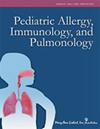土耳其新冠肺炎早期封锁期间哮喘患儿母亲的焦虑水平和健康卫生行为变化。
IF 0.8
4区 医学
Q4 ALLERGY
引用次数: 3
摘要
目的:2019冠状病毒病(COVID-19)大流行带来的限制给人们的生活带来了重大变化。本研究旨在调查土耳其COVID-19早期封锁期间哮喘儿童母亲的焦虑水平以及健康和卫生行为的变化。材料和方法:本研究是一项横断面调查,于2020年6月1日至30日在土耳其对6至11岁哮喘儿童进行调查。对儿童的母亲进行社会人口统计数据表、健康和卫生行为表、儿童哮喘控制测试和状态-特质焦虑量表。结果:哮喘组患儿123例(女性:39.0%),中位年龄、四分位间距(IQR)[最小-最大]:8.0(6)[6-12]岁;对照组88例,女47.7%,中位年龄,IQR[最小-最大]:8.0(7)[5-12]岁。在早期封锁期间,记录了更多的卫生行为和高度遵守社会隔离措施,各组之间没有差异。在大流行之前,最常用的清洁产品是通用清洁剂。然而,在封锁初期,最常用的产品是消毒剂,两组的使用情况相似。在两组中,在大流行期间,使用营养补充剂的比例都有所增加,但在封锁之前和早期期间,哮喘儿童的比例更高(P < 0.001)。哮喘组和对照组母亲的焦虑水平相似。结论:这项研究首次在土耳其表明,在2019冠状病毒病大流行的早期封锁期间,哮喘儿童的母亲与健康和卫生以及焦虑水平相关的生活方式改变与其他儿童及其母亲相似。本文章由计算机程序翻译,如有差异,请以英文原文为准。
Anxiety Levels and Changes in Health and Hygiene Behaviors in Mothers of Children with Asthma in Early COVID-19 Lockdown in Turkey.
Objective: The restrictions imposed by the coronavirus disease 2019 (COVID-19) pandemic have caused significant changes in people's lives. This study aimed to investigate anxiety levels and changes in health and hygiene behaviors in mothers of children with asthma in early COVID-19 lockdown in Turkey. Materials and Methods: This study was a cross-sectional survey conducted on children with asthma, 6 to 11 years of age, between June 1 and 30, 2020, in Turkey. A sociodemographic data form, health and hygiene behavior form, childhood asthma control test, and state-trait anxiety inventory were administered to the mothers of the children. Results: The asthma group included 123 children (Female: 39.0%) and median age, interquartile range (IQR) [minimum-maximum]: 8.0 (6) [6-12] years; the control group included 88 children (Female: 47.7%) median age, IQR [minimum-maximum]: 8.0 (7) [5-12] years. Increased hygiene behaviors and high compliance with social isolation measures were recorded in the early lockdown, with no difference between the groups. Before the pandemic, the most frequently used cleaning products were general-purpose cleaners. During the early lockdown, however, the most frequently used product was disinfectants and was similar in both groups. In both groups, the rate of using nutritional supplements increased during the pandemic period, but the rate was higher in children with asthma both before and during the early lockdown (P < 0.001). The anxiety levels of the mothers in asthma and control groups were similar. Conclusion: This study is the first in Turkey demonstrating that, in mothers of children with asthma, lifestyle changes related to health and hygiene and anxiety levels are similar to those of other children and their mothers during the early lockdown period of COVID-19 pandemic.
求助全文
通过发布文献求助,成功后即可免费获取论文全文。
去求助
来源期刊

Pediatric Allergy Immunology and Pulmonology
ALLERGY-IMMUNOLOGY
CiteScore
2.00
自引率
0.00%
发文量
23
审稿时长
>12 weeks
期刊介绍:
Pediatric Allergy, Immunology, and Pulmonology is a peer-reviewed journal designed to promote understanding and advance the treatment of respiratory, allergic, and immunologic diseases in children. The Journal delivers original translational, clinical, and epidemiologic research on the most common chronic illnesses of children—asthma and allergies—as well as many less common and rare diseases. It emphasizes the developmental implications of the morphological, physiological, pharmacological, and sociological components of these problems, as well as the impact of disease processes on families.
Pediatric Allergy, Immunology, and Pulmonology coverage includes:
-Functional and genetic immune deficiencies-
Interstitial lung diseases-
Both common and rare respiratory, allergic, and immunologic diseases-
Patient care-
Patient education research-
Public health policy-
International health studies
 求助内容:
求助内容: 应助结果提醒方式:
应助结果提醒方式:


